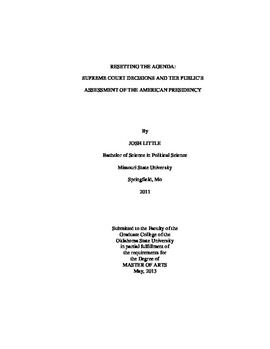| dc.contributor.advisor | Ringsmuth, Eve | |
| dc.contributor.author | Little, Josh | |
| dc.date.accessioned | 2014-09-24T14:18:09Z | |
| dc.date.available | 2014-09-24T14:18:09Z | |
| dc.date.issued | 2013-05-01 | |
| dc.identifier.uri | https://hdl.handle.net/11244/11106 | |
| dc.description.abstract | A major focus in judicial politics research has been to measure the extent to which the U.S Supreme Court behavior is constrained by the other branches of government, while leaving the Court's capacity to alter the behavior of political actors relatively untouched. This project seeks to reset the judicial politics agenda by evaluating the impact highly salient U.S. Supreme Court decisions have on the public's assessment of presidential performance and the viability of presidential candidates. Using a mixed methods approach, I quantitatively and qualitatively test the Supreme Court's influence on fluctuations in presidential approval ratings, presidential election public opinion polls, and day to day campaign donations to determine if the American population uses the information cues provided by the Court to alter the perception of their support for the presidency. I argue that the salient Supreme Court decisions will indeed have an effect on the population's evaluation of the presidency and will be exhibited through either the Affirmation Effect or the Counter-Mobilization Effect. The Affirmation Effect evaluates the Court's impact on the public when their ideological disposition aligns with the Court and encourages the citizenry to increase their support for the presidential candidate who matches the same beliefs. The Counter-Mobilization Effect evaluates the Court's impact on the public when their ideological disposition fails to align with the Court and thus out of fear that their ideology is under attack, they heavily mobilize their support for the president or presidential candidate who also ideologically disagrees. I find significant support for the Counter-Mobilization hypothesis suggesting that high salient U.S. Supreme Court decisions lead those who ideologically disagree with Court decisions to heavily mobilize their support behind the "losing president/candidate" by donating directly to the campaigns. These findings suggest the Court has an indirect impact on the presidential campaign process when it renders politically relevant decisions, and should encourage further research into the nature of the Court's influence on other branches of government. | |
| dc.format | application/pdf | |
| dc.language | en_US | |
| dc.publisher | Oklahoma State University | |
| dc.rights | Copyright is held by the author who has granted the Oklahoma State University Library the non-exclusive right to share this material in its institutional repository. Contact Digital Library Services at lib-dls@okstate.edu or 405-744-9161 for the permission policy on the use, reproduction or distribution of this material. | |
| dc.title | Resetting the Agenda: Supreme Court Decisions and the Public'S Assessment of the American Presidency | |
| dc.type | text | |
| dc.contributor.committeeMember | Mendez, Jeanette | |
| dc.contributor.committeeMember | Rudloff, Peter | |
| osu.filename | Little_okstate_0664M_12691.pdf | |
| osu.accesstype | Open Access | |
| dc.description.department | Political Science | |
| dc.type.genre | Thesis | |
